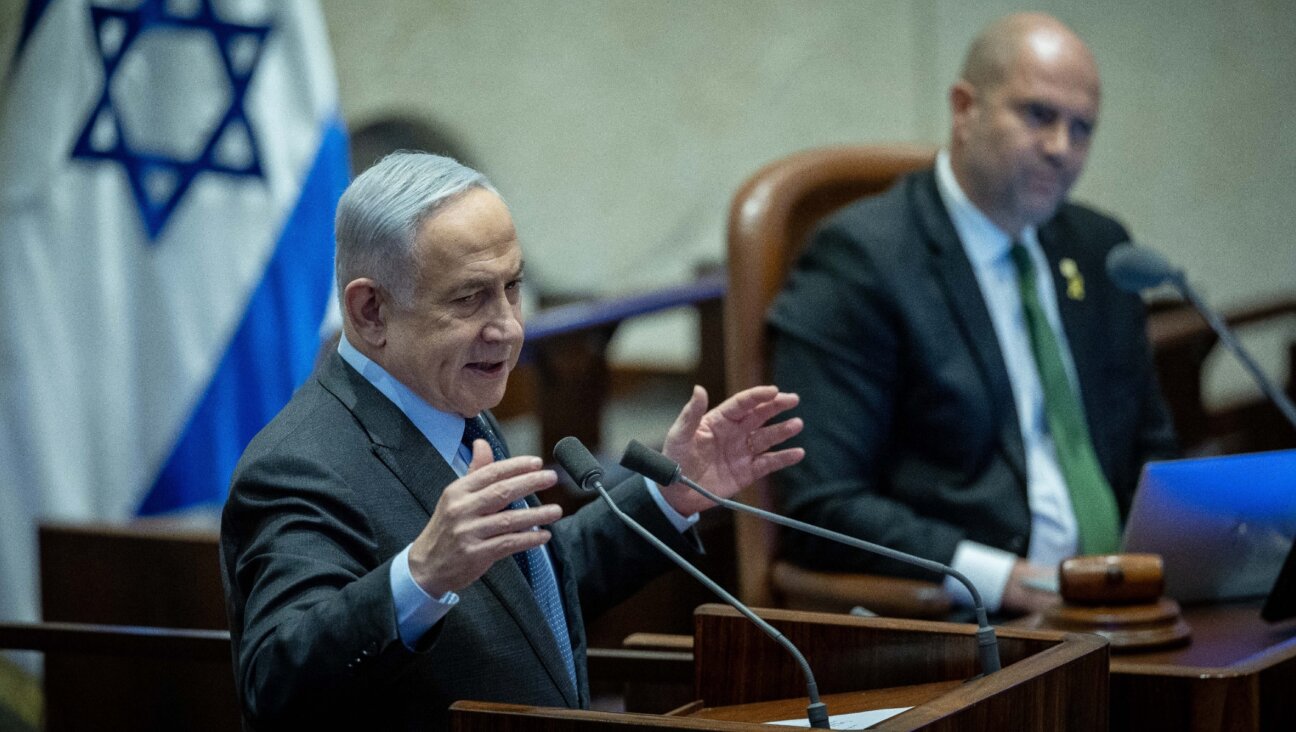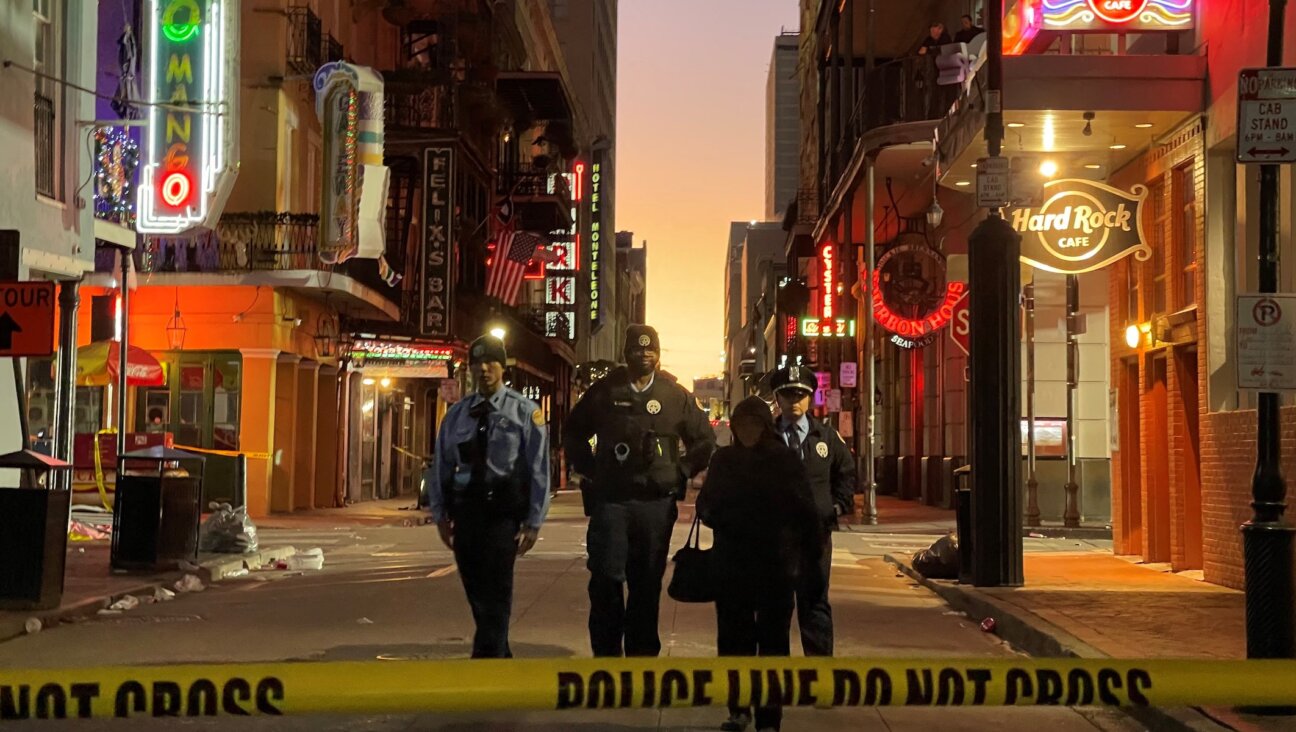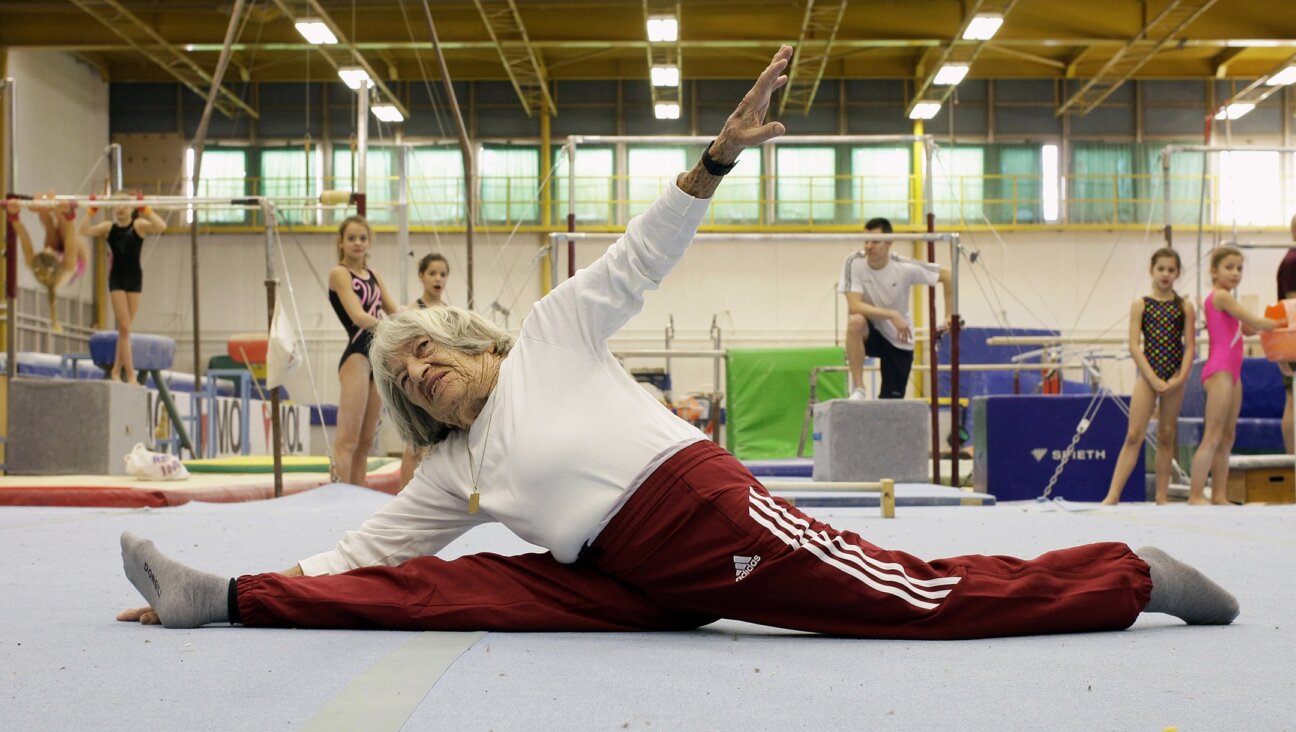Los Angeles Jewish schools won the right to reopen. Then COVID-19 struck again.
A lawsuit against the state of California filed by Jewish schools in the Los Angeles area has expanded their legal footing for in-person activities, enabling them to bring more students to campus even as coronavirus cases surge.
But the schools have not escaped the record-setting spike in California that has continued apace into December, and two have closed temporarily due to cases in the student body.
After three students in the same class tested positive before Thanksgiving, Emek Hebrew Academy, an Orthodox day school in the San Fernando Valley, told parents on Dec. 1 that the health department was shutting down the school’s in-person activities while it conducted an investigation. The school had informed the health department of the cases.

Harkham Hillel Hebrew Academy Image by Louis Keene
In Los Angeles County, schools that are determined by the Department of Public Health to have 3 or more cases within a 14-day span must close for 2 weeks.
Rabbi Mordechai Shifman, Emek’s head of school, did not respond to email and phone messages.
In Beverly Hills, Harkham Hillel Hebrew Academy was holding in-person activities despite at least two children and one teacher testing positive over Thanksgiving weekend, two faculty members said. In an email sent to parents Nov. 29, Hillel referred only vaguely to “the recent uptick of COVID-19 cases within the last 24 hours in our community,” and said the school would close for 48 hours as a precaution.
But the next day, Hillel decided to reopen its early childhood program of about 200 children a day early, on Tuesday, Dec. 1.
In an email sent to Early Childhood parents, Yirat Horwatt, early childhood director, said the school’s COVID-19 taskforce had deemed it safe after reviewing travel surveys distributed to the Hillel community.
“We were able to carefully analyze the data and have come to the conclusion that the Early Childhood Department will be able to return to learn on campus tomorrow 12/1/20,” Horwatt wrote.
Most of the elementary and middle school — about 400 additional students — returned Dec. 2. The class of the infected teacher was scheduled to return a week later, on Dec. 8.
It was unclear whether Hillel had informed the Department of Public Health about its cases, and the County did not reply to questions.
Eitan Sender, Hillel’s executive director, did not respond to multiple requests for comment. Yirat Horwatt did not reply to a request for comment sent Sunday night.

Yavneh Hebrew Academy students social-distance learning on campus in November, 2020. Image by Facebook
The closure at Emek delivered a reality check following the apparent victory the schools scored in the lawsuit. Led by Yavneh Hebrew Academy, an Orthodox day school in Los Angeles, they had successfully lobbied to be allowed to open on First Amendment grounds, and two Orthodox high schools are taking advantage of the ruling.
The lawsuit, which created legal footing for religious schools to open under guidelines for places of worship, is part of a nationwide trend of religious institutions successfully fighting back COVID-19 restrictions in court.
But now that the law has settled how schools can open, the Emek closure may force administrators to reconsider whether they should. Both the lawsuit and the schools’ actions since it was filed make clear that the schools view remote learning as a last resort, an inferior option even to operating as a camp.
“Remote learning is simply not up to the task of providing an environment where religious education can successfully impart the Jewish values and identity to Yavneh’s religious mission,” reads the complaint, which was filed Aug. 17.
Staying open seems increasingly risky in Los Angeles County, where a stay-at-home order will take effect Dec. 7. Nearly 7,000 people were testing positive per day in L.A. County over the week leading up to Dec. 7, per The New York Times. Governor Gavin Newsom announced Nov. 30 that the state projected Southern California to run out of ICU beds by mid- to late December, and ICU capacity was down to 10.3 percent as of December 5.
But the state’s regional stay-at-home order, issued by Newsom on Thursday, does not apply to schools that are already open.
Moreover, Jewish schools have invested thousands of dollars into making their schools safe. They have installed plexiglass barriers between desks and upgraded their air filters. Some have reduced the number of students on campus; others have shortened school days. Schools have built tents on their campus to facilitate outdoor learning and integrated temperature checks into their daily arrival routine.
But it may have been only a matter of time before the coronavirus struck. Now, for the first time since the pandemic began, cracks are beginning to show in the community’s defenses.
A LAWSUIT CUTS A PATH TO REOPENING
Joining Yavneh Hebrew Academy in filing the suit, titled Samuel A. Fryer Yavneh Academy v. Gavin Newsom, were Gindi Maimonides Academy and Yeshiva Rav Isacsohn/Toras Emes Academy and a pair of Christian schools, Saint Joseph Academy and Montebello Christian School.
The schools claimed that mandatory closures — though they applied to all public and private schools — infringed on their religious freedoms.
The premise of that claim, said Gordon Todd, an attorney who represented Yavneh on the case, is that the legal standard for equal treatment of a religious school is not whether its can be compared to that of a secular school, but rather to any organized group of comparable size — be it a camp, daycare center, or karate studio. Because camps and daycare centers had looser restrictions than religious schools, the argument was made that those schools were being treated unfairly.
“Children may gather in a school building to play games, take field-trips, design tie-dye T-shirts, and engage in other fun camp activities,” reads the complaint, which was filed August 17. “Those same children, however, cannot attend regular school in that same setting to study math, history, or religious studies, or engage in worship.”
After negotiating with the schools’ attorneys, on Aug. 24, the state issued guidelines for groups of children in “supervised care environments,” enabling schools to open if they could divide students into cohorts of up to 14 students and 2 teachers without the groups mixing.
The cohort guidance did not supersede the county ban on in-person school activities.
But the joint motion to dismiss the suit also included a second stipulation classifying religious instruction as religious services. Crucially, religious services do not have a numerical cap on participants if they are held outside.
Schools may thus follow the (generally looser) guidance for places of worship to hold Judaic studies classes, as long as the remainder of their educational activities are consistent with State orders for K-12 schools.
“If you’re a school that has capacity, whether it’s Mass or Judaic studies, there are some settings that you can do it with more kids and with fewer restrictions,” said Gordon Todd, an attorney who represented Yavneh on the case.
The motion to dismiss the case, which contained those stipulations, was granted by Judge John A. Kronstadt Oct. 28, and contained enough for the schools who negotiated it to declare victory.
Yavneh’s head of school, Rabbi Shlomo Einhorn, called the outcome a “mutually agreeable resolution” in an email to The Shalhevet Boiling Point.
Orthodox high schools Yeshiva University of Los Angeles (YULA) and Shalhevet both planned to open for in-person Judaic studies in November, with grades alternating days of on-campus learning.
But following the surge in cases, Shalhevet reversed its decision on Nov. 15, two days before in-person Judaic studies were scheduled to begin, according to The Shalhevet Boiling Point.

YULA Boys Nagel Family Campus Image by Louis Keene
Instead, Shalhevet held off until Dec. 1 for Judaic studies instruction only, bringing one grade to school per day for learning under cabanas set up on the roof, for a maximum of around 60 students in school at a time. The remainder will continue taking classes remotely.
YULA Boys re-opened on Nov. 11.
According to Rabbi Joseph Schreiber, YULA Boys’ principal, the campus had only incurred one positive test, by a faculty member whose recent contact had been limited to just a handful of students in an outdoor setting, with all present wearing masks. None of the exposed tested positive.
“Bli ayin hara, we’ve had a very good track record so far,” Schreiber said, using the expression that translates roughly to knock-on-wood.
Several Jewish day schools, however, have been open as day camps with extensive indoor activities, running on schedules that largely resembled typical dual-curriculum school days. Confirming that Yavneh plans to continue operating as a camp for the time being, Einhorn told The Forward that the general studies faculty is now on campus as well. General studies teachers are also on campus at Hillel, Maimonides, and Emek.
Cases Hit The Schools — Which Plow Ahead
Through the summer months, it seemed like Los Angeles’ Orthodox community had managed to avoid the worst of the pandemic. Day schools and synagogues closed not long after Purim, in late March, and as fatalities mounted elsewhere, the Los Angeles Jewish community reported relatively few.
Cases in California were low enough for the state to permit camps to open in May, but by summer’s end cases were spiking. On Aug. 12, Newsom announced that schools would be closed for in-person activities across the state indefinitely, and Los Angeles County announced soon after that it would not grant waivers.
Since then, many of the Jewish schools, including Yavneh, Hillel, Emek, and Toras Emes, have been operating as camps to get around those restrictions.
Eventually and perhaps inevitably, Covid-19 struck the campuses.
After reporting three cases to the health department, Emek went remote for the week of Nov. 30. School administrators told parents in an email that while the Department was “very pleased with the measures we have taken to date, they have requested out of an abundance of caution to close the campus” pending an investigation.
Sure enough, the county cleared the school to reopen a week later, and classes are set to resume Monday. It was unclear why the 14-day closure policy for schools with 3 cases did not apply.
At Hillel, targeted closures were prompted by a teacher and two students — siblings in the early childhood program and the middle school — testing positive around Thanksgiving weekend.
But the school’s decision to stay open — and publicly attribute the delayed reopening of some classes to their failure to return surveys, rather than the result of positive tests — rankled some in the faculty.
Two Hillel teachers said that the administration had initially committed to getting all staff and students tested on campus after Thanksgiving break, but never followed through.
“Our health is low-priority,” said the teacher, who asked to remain anonymous out of concern for their job.

YULA Boys Nagel Family Campus Image by Louis Keene
The survey, which Hillel distributed as a Google form, asked families to report their Thanksgiving plans, including whether they were flying over the holiday weekend or spending time with 15 or more people. The school sent a similar survey after the weekend.
Then, after closing the campus the following Monday (Nov. 30), Hillel emailed out an update: the early childhood program would reopen the next day.
At the same time, the teacher qualified, Zoom classes required more intense preparation, and faculty was divided on whether the campus health precautions were adequate.
Schreiber, the YULA principal, said it was not only the students and their families, but also faculty — and especially Judaic studies staff — who had been hankering to return to campus.
“Every rebbe — to a man — to their credit, wants to be in person and asked to be in person from the beginning,” Schreiber said. “Even in the beginning of the year, when it was not even possible. It was an aim we set for ourselves.”
Louis Keene is a freelance writer and reporter. To email Louis, click here. Signal: 3105718480
A message from our Publisher & CEO Rachel Fishman Feddersen

I hope you appreciated this article. Before you go, I’d like to ask you to please support the Forward’s award-winning, nonprofit journalism so that we can be prepared for whatever news 2025 brings.
At a time when other newsrooms are closing or cutting back, the Forward has removed its paywall and invested additional resources to report on the ground from Israel and around the U.S. on the impact of the war, rising antisemitism and polarized discourse.
Readers like you make it all possible. Support our work by becoming a Forward Member and connect with our journalism and your community.
— Rachel Fishman Feddersen, Publisher and CEO
























